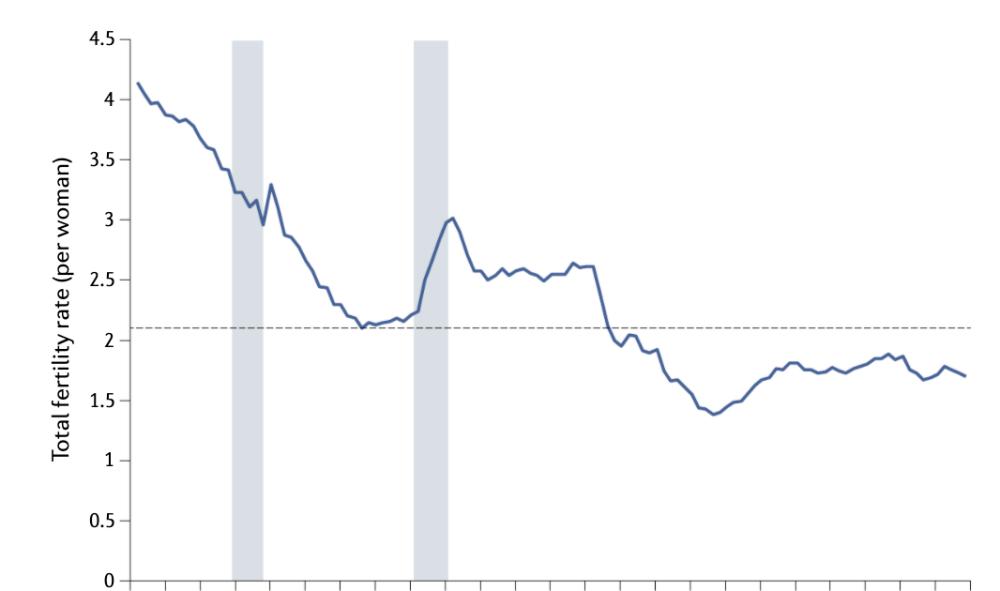Over the past half-century, birth rates have declined worldwide. But are the reasons behind this explained only by economic and socio-cultural factors, as the demographic report suggests?
According to foreign media reports on the 15th, Danish scholars recently warned that environmental factors may be having a decisive negative impact on human reproductive ability. A study they recently published in the journal Nature suggests that declining global fertility rates may be linked to pollution from fossil fuels.
The study says that direct or indirect human exposure to chemicals derived from fossil fuels can lead to today's widespread reproductive health problems such as infertility and assisted reproduction.
Fossil fuel pollution may increase infertility rates
According to the study, fertility in Denmark has steadily declined over the past 50 years, while other industrialized countries have seen this trend as well. According to a study published in The Lancet in July, fertility rates worldwide almost halved from 4.7 in 1950 to 2.4 in 2017. Declines in birth rates are often attributed to cultural and socio-economic factors, such as family planning, contraceptive use, and changes in women's roles in society, such as delayed childbearing due to education and occupation.

Fertility trends in Denmark from 1901 to 2019.
But the data shows that the downward trend in fertility rates seems to have begun in the early days of industrialization. Pregnancy rates were already falling before the birth control pill was introduced, and the overall number of abortions over the years was also declining. But instead, a growing body of research shows that human infertility rates are on the rise.
According to some survey data, unintended abortions in the United States have increased by 1 to 2 percent since 1990. In Denmark, one in ten babies is born through assisted reproductive technology, and more than 20% of Danish men have difficulty conceiving their partner naturally. In addition, cancer statistics for 2020 show that there are more than 74,000 cases of testicular cancer worldwide each year. Some studies have also shown that the quality of human sperm and eggs has also declined for half a century.
The study argues that this trend cannot be explained by genes because biological evolution takes longer. "We know very little about infertility, and the crux of the matter is figuring out why so many young couples can't conceive naturally." One of the study's authors, Nils Scarkerbeck, a professor at the University of Copenhagen, said. He and his colleagues urged the scientific community to study the effects of fossil fuel pollution on human reproductive health.
"Modern life is too dependent on fossil fuels," Skacker baker says, "and when we buy a pair of shoes, we may not realize that we are already exposed to chemicals." 10% of the world's fossil fuels are used in our daily necessities: toys, clothes, cosmetics, food, packaging, building materials and more. ”
Fossil fuel pollution is one of the factors contributing to the decline in global fertility rates.
According to him, tiny particles of fossil fuels have been found in people's blood, semen, placenta, breast milk and fat tissue, which can interfere with the body's hormonal system and have a negative impact on reproductive health.
Animal experiments have shown that plastics, chemicals, etc. can affect their reproduction and fertility
According to studies, when exposed to toxic chemicals, the endocrine of experimental mice is disturbed, which in turn affects their reproductive ability. "We know from a large number of animal experiments that plastics, chemicals, etc. can cause problems in animal reproduction and fertility." Skacker Baker said. "Of course, we can't do research on humans, but the results of animal experiments are enough to show that we need to pay attention to this."
According to a 2014 study, chemicals that interfere with the endocrine system can affect the hormonal balance, and diseases of the male reproductive system have a lot to do with this. According to a 2016 study, women's and men's reproductive abilities were affected differently by exposure to the same level of chemicals, but women were more affected during the first trimester.
Skackerbeck noted that it is important to study the relationship between human infertility and environmental factors, and researchers need to further systematically assess the causal relationship between these factors. Because the way of life in modern society is also undergoing tremendous changes, such as reduced physical activity, smoking, and increased obesity rates.
He said that if it can be confirmed that reproductive problems are indeed related to fossil fuel pollution, then at the level of action measures, not only to reduce pollution, but also to cooperate and regulate interdisciplinary disciplines is also a key part of reversing the trend of population decline.
Red Star News reporter Wang Yalin intern reporter Ding Wen
Edited by Zhang Xun
(Download Red Star News, there are prizes for the newspaper!) )